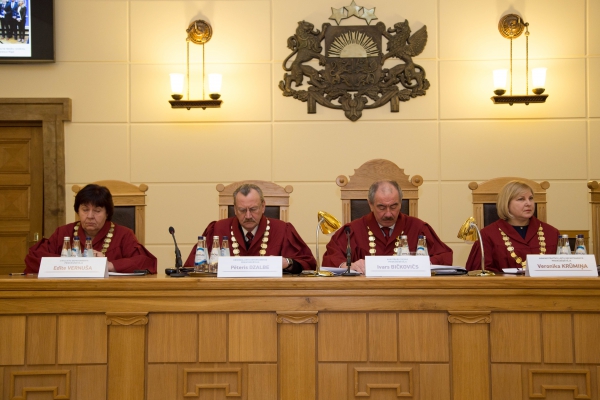Reduction of backlog of cases and development of case-law – last year’s priorities of the Supreme Court
24 February, 2018
Chairs of the Supreme Court at the Plenary Session: (from the left) Edite Vernusa, Chair of the Department of Civil Cases, Peteris Dzalbe, Chair of the Department of Criminal Cases, Ivars Bickovics, Chief Justice of the Supreme Court, and Veronika Krumina, Chair of the Department of Administrative Cases
The positive ratio of examined cases and respectable case-law are considerable achievements of the Supreme Court in the past year – as summarized by the Chief Justice of the Supreme Court Ivars Bickovics, taking into account annual reports given at the Plenary Session of February 23 by the chairs of departments and heads of other structural units.
Already for the third year the number of cases reviewed by departments of the Supreme Court exceeds the number of cases received; in 2017 this ratio was 104% – in total, 3158 cases were received by departments, 3280 cases were examined, the backlog of cases at the end of the year was 1708 cases.
The highest ratio of examined cases – 114% – was by the Department of Civil Cases; 1386 cases were received and 1579 examined. The number of the backlog of cases at the end of the year, as compared to the previous year, has decreased by 212, by the year 2017 there were 745 pending cases. Edite Vernusa, Chair of the Department of Civil Cases, said that the decrease in the number of cases received, amendments to the civil procedure, and the decrease in the number of protests filed by the Prosecutor General, but most importantly – the selfless work of the judges of the department – has given a positive result. For the second year already, the priority of the Department has been reduction of the period of time until the assignment sitting takes place, when deciding on the progress of the case or refusal to view it under cassation procedure. In the past these were 9-10 months, last year 3-4 months.
The largest backlog of cases in previous years was in the Department of Civil Cases, in the past year this "weight" has moved to the Department of Administrative Cases. Although the number of cases received by the Department of Administrative Cases has decreased, the number of cases reviewed also is smaller, as compared to the previous year, but the backlog has increased: 993 cases have been received, 884 cases have been examined, pending cases – 869. Rate of examination of cases – 89%. Veronika Krumina, Chair of the Department of Administrative Cases, said that the reason for the decrease by 14% of cases examined was due to the change of judges – two experienced judges temporarily switched to other institutions, one judge ceased to perform the duties of a judge. Although two new judges began work relatively quickly in the Department, it took time for them to work at full capacity. In addition, three judges were in long-term absence.
The Department of Criminal Cases is the only department having increase in the number of received cases – 779 cases were received, which is 25 cases more than in the previous year. However, given that the number of cases examined has increased by 62 cases – 817 cases have been examined, the backlog of cases has decreased – 94 cases. As emphasized by Peteris Dzalbe, Chair of the Department, two thirds of the working days of a year judges dedicate to perform immediate duties of a judge, and one third – to additional duties, including the duties uncharacteristic to Supreme Court as a cassation court.
In 2017, the Supreme Court began to perform duties merely those of cassation instance court, and the departments paid particular attention to strengthening cassation functions, developing and compiling case-law. The Chair of the Department of Administrative Cases noted the successful dialogue of the Department with the Constitutional Court and the Court of Justice of the European Union – the Department applied to the Constitutional Court in six cases, in two cases – referred preliminary questions to the Court of Justice of the European Union.
The Chief Justice of the Supreme Court particularly praised the work of the Division of Case-law and Research – it has been creative, constantly developing the case-law of the Supreme Court and being of great help to judges. The chairs of departments also expressed appreciation regarding the cooperation between departments and the Division.
The chairs of departments emphasized the need for greater cooperation with the regional courts, since there no longer chambers of the Supreme Court exist; the creation of a unified case-law is an opportunity and obligation of regional courts. The Chief Justice of the Supreme Court believes that the former tradition of the Supreme Court to hold seminars for judges of regional courts has to be renewed.
Reports on the work of the last year were given also by Aigars Strupiss, Chair of the Disciplinary Court, Anita Zikmane, Head of the Division of Case-law and Research, and Sandra Lapina, Head of the Administration.
At the conclusion of the Plenary Session, the judges discussed issues of internal and external communication.
Information prepared by
Rasma Zvejniece, the Head of the Division of Communication of the Supreme Court
E-mail: rasma.zvejniece@at.gov.lv, telephone: +371 67020396, +371 28652211


